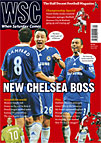 AC Milan once outbid Barcelona for his services, but three years later he was on the Bolton bench. James Calder reports on a player once known as “Killer”
AC Milan once outbid Barcelona for his services, but three years later he was on the Bolton bench. James Calder reports on a player once known as “Killer”
Few players cause as much head-scratching as the one-season wonder. Former AC Milan and Bolton misfit Javi Moreno is one such accidental hero.
Recently retired after a spell at cash-strapped third-tier outfit Ibiza, Moreno was once one of the most coveted strikers around. A Barcelona reject with a weight problem, he was rescued from lower-division obscurity in the late 1990s by upwardly mobile but unfashionable Alavés. Teaming up with fellow waifs and strays such as Jordi Cruyff, he produced an unexpected spate of goals during the 2000-01 season, helping consolidate the club’s place in La Liga and propelling them to a UEFA Cup final against Liverpool.
The 26-year-old Moreno increased his cachet by scoring a well-taken double in the nine-goal thriller in Dortmund. Just days later AC Milan headed off a queue of suitors including the likes of Valencia, Barça and John Gregory’s Aston Villa by matching a buy-out clause of €9 million (£5.6m), giving Alavés a spectacular return on their initial investment of €18,000.
Milan had every reason to believe they were getting their money’s worth. In his brief pomp Moreno fully justified his “Killer” soubriquet. A tidy finisher and willing runner, he thrived on the service of his team-mates, striking six times in Alavés’ improbable European run and amassing 21 league goals that term – a tally bettered only by Raul and Rivaldo – while winning five caps for Spain.
Yet, after being likened by Milan vice-president Adriano Galliani to Gerd Müller and Jean-Pierre Papin, the new recruit struggled to adapt to a supporting role alongside Andriy Shevchenko and Filippo Inzaghi, adding his name to the list of Spanish exports who have failed to cope with the demands of Serie A. Moreno voiced familiar gripes during his one-year stay, describing the Italian game as “too physical and tactical” and lamenting the fact that his team-mates preferred to go home after training rather than head to the bar.
His frustration surfaced during a rare league outing at Venezia. Celebrating his first goal in Milan colours, Moreno ran to the away end and pointedly put his index finger to his lips. A second and final league goal followed minutes later along with an apology, but while the fans forgave him his petulance, his ultimately mediocre performances proved harder to take.
Interviewed on Spanish TV late last year, Moreno accepted that Milan’s initial faith may have been misplaced: “You need something extra to triumph at a club like that and I probably didn’t have it. I’m not ashamed to say it, but maybe it was all too much for me.” Laudable as his admission was, calcio watchers had long since reached the same conclusion. Sensing a dud, Milan offloaded Moreno to Atlético Madrid.
Although happy to be back home, Moreno never came close to justifying Atleti’s €12m outlay. A self-confessed overeater, he fell prey to the lifestyle problems that had dogged him early in his career. Eclipsed by the emergence of Fernando Torres and failing to last the pace in training sessions as his weight fluctuated, he lost favour with coach Luis Aragonés and his successor Gregorio Manzano, making only a handful of appearances in the first half of 2003-04.
As Moreno’s stock continued to plummet, Sam Allardyce offered him a tilt at redemption. Signed on loan as a replacement for flop Mario Jardel after Bolton had failed to land German beanpole Carsten Jancker, Moreno came spinning through the Reebok’s revolving doors with Guatemalan giant Dwight Pezzarossi and a fading Steve Howey as part of one of Big Sam’s typically eclectic transfer-window assortments.
Allardyce reckoned he’d picked up a proven performer. But Moreno was no Djorkaeff or Okocha, and five years on from his fruitless bench-warming stint even hardcore Wanderers fans struggle to recall anything about him other than a 12-minute Carling Cup final cameo, an elasticated hairband and one big backside. After this a spell as understudy to David Villa at Zaragoza brought more complaints about a lack of opportunities, though they had a hollow ring to them by now.
Four straight seasons in the Italian, Spanish and English top flights had yielded just 11 goals in 71 appearances. And when Moreno – finally accepting his place in the scheme of things – dropped down two divisions and started banging them in for Cordoba, it merely underlined that the Killer had long ceased to be deadly.
From WSC 266 April 2009